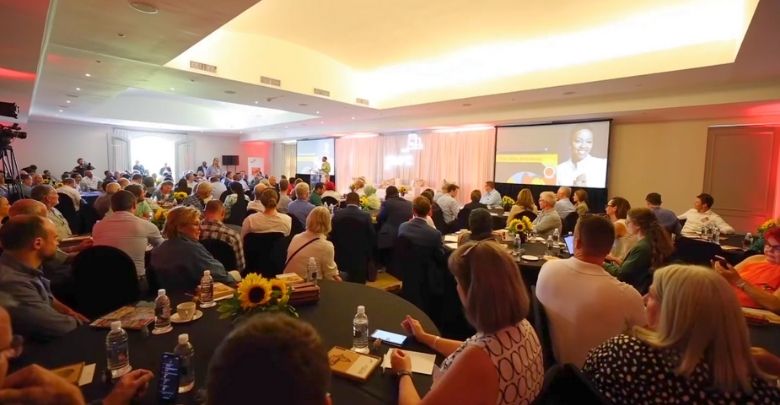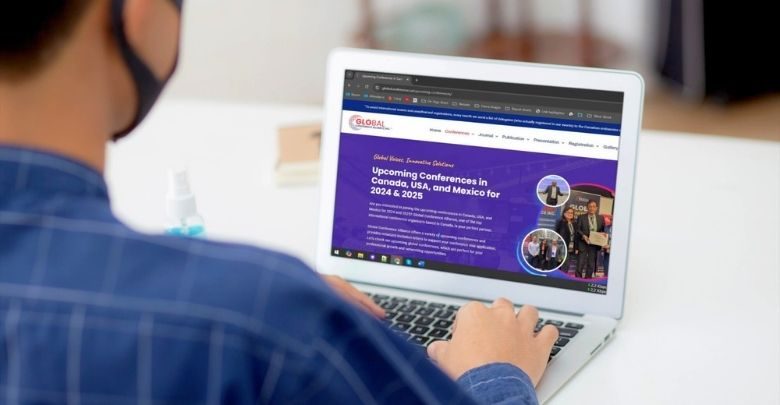Finding the right platform to share your research is key to gaining recognition in your field. Conferences offer an excellent opportunity to connect with experts, expand your knowledge, and showcase your work to a broader audience. But the real question is, how do I find conferences to present research?
The answer lies in strategic searching and knowing where to look. By utilizing academic resources, networking, and online tools, you can identify the most suitable events for your research presentations.
Would you like to explore the steps and tips for finding the best conferences for presenting your research? Keep reading as we guide you through a detailed approach to improve your academic progress.
Why Presenting Research at Conferences Matters?
Presenting research at conferences is more than just a routine academic activity; it’s an opportunity to connect, grow, and develop your career. Let’s explore the key benefits that make presenting at conferences so valuable.
- Networking Opportunities: Conferences bring together experts from various fields. Presenting your research opens doors to connect with like-minded professionals, mentors, and potential collaborators.
- Feedback and Improvement: Direct feedback from peers and industry leaders helps you refine your work. Their constructive criticism can guide your research in new directions and improve its overall quality.
- Building Academic Credibility: Sharing your work in a public forum increases your visibility and credibility in your field. It establishes you as a serious researcher dedicated to contributing to knowledge.
- Inspiration for New Ideas: Engaging with other presentations and discussions at conferences can spark fresh ideas for your research. This exposure helps you see your topic from different perspectives.
- Boosting Communication Skills: Presenting your research to an audience improves your public speaking skills. It builds your confidence in explaining complex ideas clearly and concisely.
- Publication Opportunities: Many conferences offer the chance to have your research published in their proceedings or journals. This boosts your work’s reach and ensures it gets recognized by a wider audience.
Presenting at conferences isn’t just about sharing knowledge; it’s about learning, growing, and opening the way for future success in your research career.
How Do I Find Conferences to Present Research?
Finding the right conference to present your research can be crucial for your academic or professional journey. It’s more than just finding an event; it’s about choosing a platform that aligns with your goals and can give your work the visibility it deserves. Here are the most effective ways to find the most suitable conference for your research.
Step 1: Identify Your Research Focus
The first step in finding a conference is knowing your research focus. Pinpointing your specific area of study helps you target events that are directly relevant to your work. Start by listing keywords and topics that summarize your research. Use these terms when searching for conferences, as most events categorize themselves according to specialized fields.
Step 2: Using Academic Databases and Platforms
Using academic databases and research platforms is a highly effective way to discover upcoming conferences. These resources offer a broad selection of events across various fields, often including submission deadlines and specific themes. By setting alerts or regularly checking these platforms, you can stay up-to-date with the latest opportunities to present your research.
Step 3: Join Professional Associations
Membership in professional associations is one of the most strategic ways to access exclusive conference listings. Many associations have annual or biannual conferences where they invite their members to present their latest findings. Networking within these organizations also means you’ll often hear about new and smaller events that might not be widely advertised but are crucial for your niche.
Step 4: Use Social Media and Online Communities
Social media platforms like LinkedIn and Twitter are more than just networking tools; they’re also great for discovering research events. By following hashtags related to your field or joining relevant groups, you can stay informed about upcoming conferences. Engaging with these online communities not only keeps you updated but can also lead to personal recommendations from peers who have attended similar events.
Step 5: Browse University and Research Institution Websites
Universities and research institutions often host specialized conferences that are perfect for presenting academic work. Visit the event pages of universities, especially those known for strong programs in your research area. These conferences usually focus on innovative research and are excellent for gaining feedback from fellow academics and experts in the field. They can also be more affordable, particularly for students and early-career researchers.
Step 6: Explore Conference Directories and Search Engines
Dedicated conference directories are specifically designed to help researchers find events in their fields. These directories allow you to filter searches based on location, date, and subject area, making it easier to find a conference that matches your needs. Using the best websites for finding conferences simplifies the process and offers a wide range of choices at your fingertips.
Step 7: Consult with Mentors and Colleagues
One of the most reliable ways to find a conference is through word-of-mouth recommendations from mentors and colleagues. These trusted individuals can offer insights into the credibility and quality of different conferences based on their own experiences. They might even suggest hidden gems—smaller, high-impact events that you wouldn’t easily find through a standard search.
By combining these strategies, you’ll be well-equipped to find the most suitable conference to present your research. Remember, the right event can significantly amplify your work’s reach and help you build a solid network in your field. Use these methods to make your search efficient, targeted, and aligned with your academic or professional goals.
Types of Conferences Are Suitable for Presenting Research
Choosing the right conference is crucial for effectively presenting your research. Each conference type serves a different purpose and audience, so getting to know the options can help you make the best choice. Here are the best types of conferences for presenting your research.
Academic Conferences
Academic conferences are ideal for researchers looking to present original studies to a scholarly audience. These events often include paper presentations, poster sessions, and panel discussions, making them perfect for gaining feedback from peers and experts in your field.
Industry Conferences
If your research has practical applications, industry conferences are a great option. These events focus on innovations and trends within a specific sector. Presenting here can help create a connection between theoretical research and real-world practice, attracting interest from professionals and stakeholders.
Symposiums
Symposiums are smaller, topic-specific gatherings that encourage in-depth discussions on focused research areas. They offer a more intimate setting, allowing for direct engagement with fellow researchers and specialists. For example, you might explore upcoming conferences in Mexico that focus on your specific field to find a suitable symposium for your research.
Workshops
Workshops provide a collaborative environment where researchers can present their findings while also learning from others. These interactive sessions focus on skill-building and knowledge exchange, making them ideal for researchers who want to refine their ideas and methodologies through group feedback.
International Conferences
International conferences bring together a global audience of researchers, practitioners, and academics. These events are perfect for those looking to expand their network and gain international exposure for their work. Presenting at an international conference can significantly improve your research’s visibility and impact.
Selecting the right type of conference can amplify the reach and influence of your research. Being aware of these options ensures that your work reaches the audience best suited to appreciate and utilize it.
How to Determine Conference Quality Before Submitting Your Research?
Submitting your research to a conference is a big step, so make sure the event is worth your time and effort. Determining the quality of a conference can save you from wasting valuable resources on low-impact or predatory events. Here are some effective ways to assess conference quality.
Check the Organizers’ Reputation
Look into the organizations or institutions hosting the conference. Reputable organizers are often affiliated with well-known universities, professional associations, or industry leaders. Their involvement is a good indicator that the conference is credible and respected.
Review the Conference History
A well-established conference typically has a track record of successful past events. Check how many years the conference has been running, its previous locations, and the feedback it received. Conferences with a strong history tend to maintain high standards.
Assess the Quality of Speakers and Attendees
The caliber of keynote speakers and attendees is a clear sign of a conference’s value. If previous editions featured well-known experts, researchers, and professionals in your field, it’s likely to be a high-quality event that attracts a knowledgeable audience.
Look for Peer Review Processes
Conferences with a rigorous peer review process ensure that only high-quality research is accepted. Check if the conference mentions a review panel or editorial board. A transparent and stringent review process indicates the credibility of the event.
Examine Publication Opportunities
High-quality conferences often provide opportunities to publish your research in reputable journals or conference proceedings. Look into the publication partners or indexed journals associated with the event to gauge its academic influence.
Watch Out for Predatory Practices
Be wary of conferences that charge high fees without providing clear information about their benefits or review processes. Avoid events that seem more focused on profit than on promoting quality research.
These steps can help you identify conferences that truly value academic excellence, ensuring your research reaches the right audience.
How to Prepare for a Successful Research Presentation?
Preparing for a research presentation can feel challenging, but with the right approach, you can turn it into a rewarding experience. Focusing on these strategies will help you deliver a clear, engaging, and memorable presentation that resonates with your audience.
- Know Your Audience: Knowing your audience’s background and interests allows you to adjust your presentation to their level of knowledge. This ensures your message is clear and relevant, helping you connect with your listeners more effectively.
- Structure Your Content Clearly: Organize your presentation with a strong introduction, a detailed middle section, and a concise conclusion. A clear structure makes it easier for your audience to follow your key points and stay engaged throughout.
- Create Visual Aids: Use visuals like slides, graphs, and charts to support your points. Visual aids can simplify complex data and make your presentation more engaging. Avoid cluttered slides and focus on using visuals that enhance understanding.
- Practice, Practice, Practice: Rehearse your presentation multiple times to build confidence. Practicing helps you refine your delivery, manage timing, and prepare for potential questions. The more comfortable you are with your material, the more natural you’ll appear.
- Focus on Your Delivery: Pay attention to your tone, pace, and body language. Speak clearly, make eye contact, and use gestures to emphasize key points. An enthusiastic delivery can make your presentation more compelling and help maintain your audience’s interest.
- Prepare for Q&A: Anticipate possible questions from your audience and prepare thoughtful answers. Being ready for the Q&A session demonstrates your expertise and helps you engage with the audience on a deeper level.
Following these steps will ensure you deliver a polished and impactful research presentation that leaves a lasting impression on your audience.
Overcoming Challenges in Finding Conferences for Research
With so many choices and limited information available, it can be challenging to find the right conference to present your research. However, overcoming these obstacles is possible with a strategic approach. Here are some effective ways to tackle the challenges of finding conferences for research.
Start Early and Plan Ahead
Early planning gives you a head start. Begin by marking important deadlines and setting reminders. This way, you won’t miss any key dates and have ample time to prepare a strong submission.
Leverage Online Conference Directories
Use specialized conference directories to find the most suitable conferences according to your needs. These platforms categorize events by field, making it easier to filter and find the right match for your research focus.
Engage in Academic Networks
Joining academic networks like LinkedIn groups relevant to your field can provide valuable leads on upcoming conferences. Researchers often share information and recommendations in these communities.
Seek Recommendations from Peers and Mentors
Consult with your colleagues, mentors, and fellow researchers. They can offer insights into which conferences are credible and which to avoid, based on their experiences. When finding conferences for presentations, having this collective knowledge can save you time and lead you to the most suitable options.
Set a Budget and Look for Funding Opportunities
Budget constraints can be a major hurdle, but planning a budget and seeking travel grants or sponsorships can help. Some conferences even offer financial support to young researchers or students.
Use Social Media to Stay Updated
Follow relevant hashtags and groups on platforms like Twitter and LinkedIn to stay informed about upcoming events in your research area. Social media is a great tool to find hidden gems that might not be listed elsewhere.
By using these strategies, you can overcome the challenges and find the most suitable conferences to present your research, ultimately enhancing your visibility in the academic community.
Frequently Asked Questions
When looking for the right conferences to present your research, it’s natural to have a few questions. Below are some common FAQs that might help clarify the process and offer practical tips to get you started on your search.
Is it Necessary to Attend Conferences to Advance My Research Career?
Yes, attending conferences can significantly benefit your research career. They provide networking opportunities, help you gain feedback on your work, and can open doors to collaborations. Conferences also help in building your reputation and staying updated with the latest developments.
How Do I Know if a Conference is Credible?
To determine a conference’s credibility, check its history, review the quality of previous speakers, and look for a transparent submission process. Avoid conferences that have overly aggressive marketing or high fees without providing clear value in return.
Can Students Present Research at Academic Conferences?
Absolutely! Many conferences actively encourage student participation and have special categories or sessions dedicated to student research. Presenting at these conferences can be a great way for students to gain experience, feedback, and valuable connections in their field.
Do All Conferences Require a Research Paper Submission?
No, not all conferences require a full research paper. Some accept abstracts, posters, or even proposals instead. It’s essential to read the specific conference guidelines to understand their submission requirements and what they expect from potential presenters.
Is Online Research Presentation as Effective as in-Person?
Yes, online presentations can be just as effective as in-person ones, especially when reaching a global audience. Virtual conferences offer flexibility, reduced costs, and opportunities to connect with researchers worldwide, making them a practical choice for many presenters.
Final Words
You may have trouble finding a conference where your research will be presented, but it’s a rewarding process that can upgrade your academic career. Knowing how do I find conferences to present research is the first step toward sharing your ideas with a wider audience.
By taking a strategic approach, using reliable resources, and leveraging your network, you can find the perfect platforms for your work. Each step you take brings you closer to the right audience that values and understands your contributions.
So, don’t hesitate to start your search and make your mark in your field. Keep exploring, learning, and presenting your research to inspire others and take your career to the next level.








